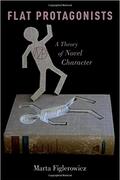
Flat Protagonists is a book of literary theory that examines a selection of British and French novels ranging from the late seventeenth to the early twentieth century. The authors it discusses are Aphra Behn, Isabelle de Charrière, Françoise de Graffigny, Thomas Hardy, and Marcel Proust. These writers’ novels all center around a unique narrative device, referred to as the “flat protagonist.” These novels’ character construction tends asymptotically toward what E. M. Forster describes as “flatness.” Their protagonists come ever closer to seeming, as Forster puts it, to be “constructed around a single idea or quality” of limited sophistication and interest. Their behaviors are increasingly stereotypical and predictable, and their means of responsiveness and expression progressively diminish, until other characters no longer even contradict, but simply disregard, what they say. At the same time, flat protagonists are also, against those odds, protagonists: they are consistently framed as major characters, and no other represented person usurps this central place. By drawing attention to the limitations of these characters as objects of other people’s interest, the novels in question set in place a form of “flat realism” whose aim is to reduce our expectations about how much any particular person’s self-expression interests or affects anybody else. This mode of inquiry in narrative theory is proposed as a counterweight to critics’ prevalent emphasis on novels as means of appreciating the complex difficulty of first-person experience and interpersonal communication.